In the ever-evolving landscape of cricket, player transitions and strategic decisions often dominate discussions among fans and analysts alike. Recently, former Pakistan cricketer Ahmed Shehzad weighed in on the career trajectory of Sarfaraz Ahmed, a prominent figure in Pakistan cricket and former captain of the national team. His comments come at a pivotal moment, particularly as the Pakistan Cricket Board (PCB) announced the squad for the upcoming Test against England.
The Current Scenario
As the PCB revealed a 15-member squad that includes fresh talents like fast bowling all-rounder Aamir Jamal and left-arm spinner Noman Ali, Sarfaraz retained his position as the backup wicketkeeper alongside Mohammad Rizwan. This decision reflects the PCB’s ongoing efforts to balance experience with youth, a delicate act that is crucial for the team’s future.
In the recent Champions One-Day Cup, where Sarfaraz served as a mentor for the Dolphins, Jason Gillespie, the red-ball coach, made noteworthy observations about the aging wicketkeeper. Gillespie pointed out that as Sarfaraz’s age increases, the need to explore young talents for the wicketkeeping position becomes more urgent. This perspective resonates with many fans who recognize that while experience is invaluable, the future must also be secured by nurturing emerging players.
Shehzad’s Perspective
Ahmed Shehzad, known for his candid opinions, shared his thoughts on his YouTube channel, addressing Gillespie’s remarks. He acknowledged Sarfaraz’s considerable contributions to Pakistan cricket, including his captaincy during the victorious 2017 Champions Trophy campaign. Despite facing criticism regarding his leadership and decision-making skills, Sarfaraz has consistently demonstrated resilience and skill on the field.
Shehzad emphasized the importance of Sarfaraz’s role in the team and suggested that while his contributions cannot be overlooked, it might be time for Sarfaraz to reflect on his career direction. He stated, “Sarfaraz Ahmed has made significant contributions to Pakistan cricket. However, he must now consider his career direction, especially as he’s not getting younger.” This call for reflection is a crucial part of the conversation surrounding not just Sarfaraz but many athletes as they approach the later stages of their careers.
crossorigin=”anonymous”>The Need for Transition
Gillespie’s remarks about giving opportunities to younger wicketkeepers highlight a pressing need within the Pakistan cricket framework. The question arises: who will step into Sarfaraz’s shoes when the time comes? Identifying capable replacements is essential for ensuring that Pakistan cricket continues to thrive. While Sarfaraz has been a reliable performer, cricket is a game of evolution, and the need for fresh talent is constant.
Emerging wicketkeepers like Mohammad Haris and Ben Dunk have shown promise, yet their consistency at the international level remains a subject of debate. The PCB must undertake a thorough evaluation of the talent pool to ensure a seamless transition when Sarfaraz decides to step back or when the team requires a change.
A Look Back at Sarfaraz’s Journey
Sarfaraz Ahmed’s journey in cricket has been nothing short of remarkable. He made his debut for the national team in 2009 and quickly established himself as a competent wicketkeeper-batsman. His crowning achievement came in 2017 when he led the team to victory in the ICC Champions Trophy, a milestone that solidified his status in Pakistan cricket history.
However, Sarfaraz’s journey has not been without its challenges. Following a string of disappointing performances, he faced the tough reality of being dropped from the national side, a fate that many athletes dread. Despite this setback, Babar Azam’s support helped Sarfaraz maintain his connection with the team, highlighting the importance of camaraderie in professional sports.
crossorigin=”anonymous”>The Balance of Experience and Youth
The ongoing discourse about Sarfaraz’s future is not merely about one player; it reflects a broader strategy in Pakistan cricket. The balance between seasoned players and youthful exuberance is critical for sustainable success. Teams that rely solely on experience risk stagnation, while those that field inexperienced players without adequate guidance can falter under pressure.
Shehzad’s insights prompt a vital discussion: how can the PCB ensure that the transition from experienced players to younger ones is smooth and effective? One approach could involve integrating young talents into the squad gradually while retaining experienced players who can mentor them. This not only preserves the team’s competitive edge but also fosters a culture of learning and growth.
The Role of Mentorship
As Sarfaraz continues in his role as a mentor for the Dolphins, his influence on younger players is invaluable. Mentorship plays a crucial role in sports, as experienced players can offer insights and guidance that are often learned only through years of experience. Shehzad’s acknowledgment of Sarfaraz’s contributions underscores the importance of having veterans who are willing to share their knowledge with the next generation.
In a team environment, mentorship can enhance performance and boost the confidence of younger players. As Sarfaraz navigates this transitional phase in his career, he has the opportunity to shape future stars of Pakistan cricket, ensuring that his legacy extends beyond his playing days.
crossorigin=”anonymous”>Fans’ Perspectives
The conversation surrounding Sarfaraz’s career has sparked varied reactions among fans. Some believe that he still has much to offer, citing his past performances and leadership qualities. Others agree with Shehzad and Gillespie, emphasizing the need for fresh talent to ensure that Pakistan cricket remains competitive on the international stage.
Social media platforms are buzzing with discussions about Sarfaraz’s future. Hashtags like #SarfarazFuture and #YoungGunsOfCricket have emerged, reflecting the divided opinions among supporters. This digital dialogue is significant, as it showcases the passion and investment fans have in the success of their national team.
The Road Ahead
As the Pakistan team prepares for the upcoming Test against England, Sarfaraz Ahmed’s presence as a backup wicketkeeper remains a point of focus. The selection of both experienced players and new talents indicates the PCB’s strategy of blending experience with potential. This approach may not only bolster the team’s performance but also facilitate the necessary transition as seasoned players consider their next steps.
For Sarfaraz, the upcoming matches present an opportunity to reaffirm his place in the team while contemplating his future direction. His contributions will undoubtedly be scrutinized, but the focus should also be on how he can leverage his experience to aid the younger players in the squad.
Embracing Change
Change is a constant in cricket, and adapting to it is vital for success. As Ahmed Shehzad articulated, the future of Sarfaraz Ahmed and Pakistan cricket relies on a thoughtful approach to career direction and player development. The balance of retaining invaluable experience while ushering in new talent will be crucial in the years to come.
As fans and analysts alike watch this evolving narrative, the ultimate goal remains clear: to see Pakistan cricket flourish both now and in the future. The journey may be fraught with challenges, but with a strategic vision and an eye on nurturing talent, the prospects remain bright.
crossorigin=”anonymous”>






